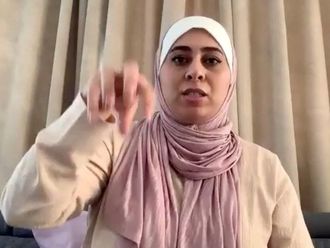United Nations: The Iran nuclear deal must be changed if the United States is to remain in it, the top US diplomat said on Tuesday, suggesting its key limits on the Iranian nuclear programme must be extended.
Making his debut appearance at the annual United Nations General Assembly, US President Donald Trump accused Iran of exporting “violence, bloodshed and chaos” and of seeking to project its influence in Yemen, Syria and elsewhere in a region rife with sectarian conflicts.
“We cannot let a murderous regime continue these destabilising activities while building dangerous missiles, and we cannot abide by an agreement if it provides cover for the eventual construction of a nuclear programme,” Trump said.
He saved his harshest words for the 2015 pact struck by Iran and six major world powers under which Tehran agreed to restrict its nuclear programme in return for the loosening of economic sanctions.
“The Iran deal was one of the worst and most one-sided transactions the United States has ever entered into. Frankly, that deal is an embarrassment to the United States, and I don’t think you’ve heard the last of it — believe me,” Trump said.
His chief diplomat, Secretary of State Rex Tillerson, went further, telling Fox News that the agreement must be changed or the United States could not stick with it.
Tillerson said the “sunset” clauses, under which some of the deal’s restrictions on Iran’s nuclear programme expire from 2025, were of particular concern.
“If we’re going to stick with the Iran deal, there has to be changes made to it. The sunset provisions simply is not a sensible way forward,” he said.
“It’s just simply ... kicking the can down the road again for someone in the future to have to deal with,” he added.
In contrast, French President Emmanuel Macron praised the agreement during his speech and said it was inconceivable to abandon it.
“Renouncing it would be a grave error, not respecting it would be irresponsible, because it is a good accord that is essential to peace at a time where the risk of an infernal conflagration cannot be excluded,” Macron said.
The French President said he understood US concerns but thought the way to address them was to open up a negotiation designed to extend limits on its nuclear programme beyond 2025.
Macron and other supporters of the accord say weakening or scrapping the deal would add fuel to a regional powder keg and deter North Korea from negotiating on its nuclear programme.
The July 14, 2015 accord aims, for a decade, to extend the amount of time it would theoretically take Iran to produce enough fissile material for an atomic bomb — so-called breakout time — from several months to a minimum of one year.
Critics of the deal, including Israeli Prime Minister Benjamin Netanyahu, worry that, once the main restrictions on Iran’s nuclear programme expire in 10 to 15 years, Tehran will be in a position to quickly develop an atomic weapon, if it wishes.
The US President must decide by October 15 whether to certify that Iran is complying with the pact, a decision that could sink the deal. If he does not, the US Congress has 60 days to decide whether to reimpose sanctions waived under the deal.
Netanyahu was also unsparing in his criticism of the nuclear pact, though Israeli officials privately admit that having some restrictions on Iran’s programme are better than none.
“Change it, or cancel it. Fix it, or nix it,” Netanyahu said in his UN speech, saying the most important change was to eliminate the “sunset” clauses.
Iranian President Hassan Rouhani warned on Tuesday that the United States would forfeit the trust of the international community if it abandons the nuclear accord.
“If the United States were not to adhere to the commitments and trample upon this agreement, this will mean it will carry with it the subsequent lack of trust of countries,” Rouhani, in New York to attend the UN General Assembly, told NBC.
“After such a possible scenario, which country would be willing to sit across a table from the United States of America and talk about international issues?











